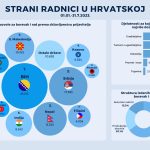ZAGREB, May 13, 2018 – About 70 percent of Croats are satisfied with their jobs, the Federation of Independent Trade Unions (SSSH) said while presenting the results of a survey on job satisfaction.
About 70 percent of Croatian respondents said they were pleased with their job, while the EU average in 2015 was 86 percent, SSSH associate Sunčica Brnardić said ahead of a conference on job quality, organised by the SSSH and the Friedrich Ebert Foundation. One in five Croatians said they were very pleased with their job, while in Germany one in three said so.
There was a drastic difference between respondents working on fixed-term contracts and those on open-ended contracts, with the former saying they were dissatisfied because it was more difficult for them to plan their future and ensure their income. Fixed-term contracts were also seen as a source of job insecurity. “Those respondents expressed drastically less satisfaction on all elements, saying that they had no influence on their work conditions or training and were less satisfied with their working hours,” Brnardić said.
The survey showed that the strongest reason for job satisfaction was pay, followed by working in their profession, the level of education, coverage by a collective agreement and the existence of trade unions.
SSSH leader Mladen Novosel said that Croatian workers were relatively satisfied with their job and work conditions, noting that this mostly depended on the terms of their contract.
Currently slightly over 20 percent of Croatian workers work on fixed-term contracts, while the European average is 14.4 percent, and the biggest problem is that almost all newly-employed workers are hired on fixed-term contracts, Novosel warned. “All fixed-term contract workers, with contracts of less than six months’ duration, have by far less favourable work conditions, lower wages and more problems with employers honouring their working hours,” the SSSH leader said.
Job satisfaction ranges between 65 and 67 percent, but compared with other EU countries, Croatian workers rank second to last, above Greeks. “That is why one should not be satisfied with the survey results,” Novosel said.
The survey was carried out by Hendal agency, covering 500 people who in the past year had been in some kind of paid employment for at least three months.







